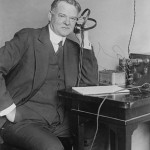New Poll: Republican Senate Race Changes as Presidential Race Stays Steady
With just over a month to go to the Aug. 14 primary election that will pick a Republican candidate for US Senate, the four-way race is changing shape, according to results released Wednesday by the Marquette Law School Poll. Support for Madison businessman Eric Hovde is rising while support for former Congressman Mark Neumann and Assembly Speaker Jeff Fitzgerald is declining, the poll results show. Former Governor Tommy Thompson’s support has changed little and he remains in the lead. But with 25% of likely voters in the primary saying they are undecided, the outcome of the race is hard to foresee.
The poll found Thompson supported by 35% of likely primary voters, compared to 34% a month ago, and Hovde supported by 23%, up from 14% a month ago. Neumann was at 10% (down from 16%) and Fitzgerald at 6% (down from 10%).
In match-ups of each of the four Republican candidates against the Democratic candidate in the November final election, Congresswoman Tammy Baldwin, the current outcomes were within the margin of error, with Thompson ahead of Baldwin and Baldwin leading Hovde, Neumann, and Fitzgerald.
The poll also found little change in the presidential race in Wisconsin, with Democratic President Barack Obama ahead of Republican challenger Mitt Romney, 51% to 43%.
In the aftermath of the US Supreme Court decision on the federal health insurance law, there was little overall change in Wisconsinites’ opinions of the law and in the overall numbers for how people rated the Supreme Court. But there was a notable decrease in favorable views of the Court among Republicans and a notable increase among Democrats.
For more information and full results of the poll, click here.


